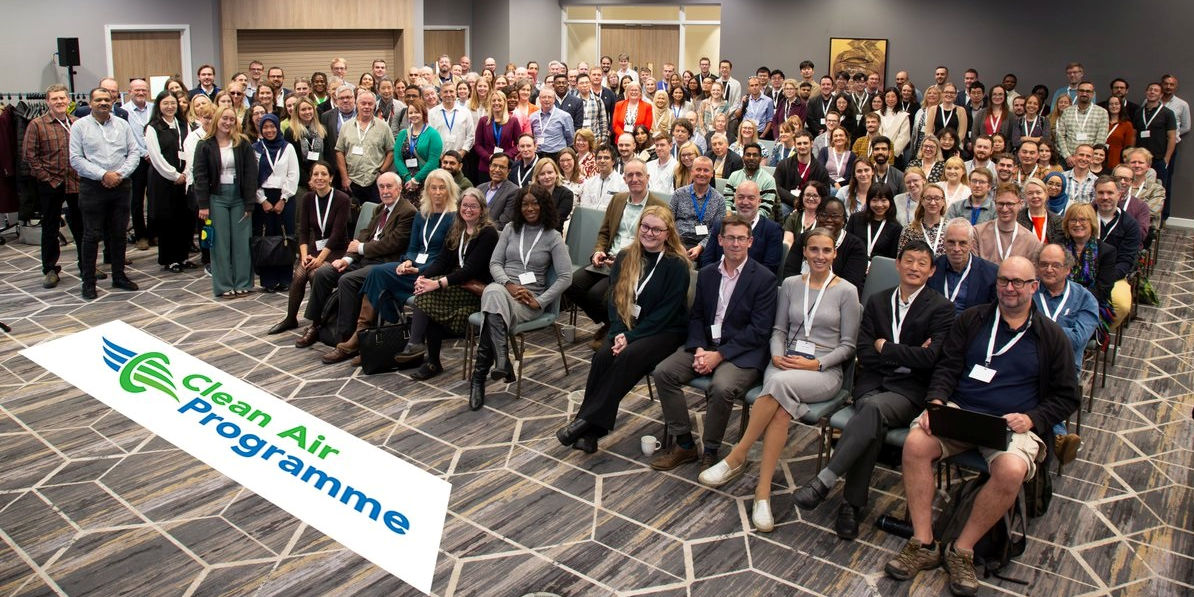INGENIOUS showcased at the UK Clean Air Conference
Posted on Tuesday 8 October 2024

Dr David Shaw is a member of the INGENIOUS team who studies indoor air quality using a detailed chemical model called INCHEM-Py. He predicts how pollutants created by indoor activities evolve indoors. He is currently working to improve and expand the model, design experiments to reduce uncertainties, and develop ways to visualise complex processes. Recently he has used the over 3.5 million data points gathered from the INGENIOUS households to estimate how long windows should be opened to reduce exposure to pollution created when we cook. He’s working with a team on emissions from different cooking methods, such as making curries and stir-fries, to understand how cooking without proper ventilation affects indoor air quality. David is one of many researchers involved in the INGENIOUS project, which aims to understand air pollution in homes. Although his research is still in its early stages, he shared information from his ongoing work at the UKRI/MET Clean Air Conference.
The 2024 UKRI/Met Office Clean Air Conference in Birmingham on October 2nd and 3rd welcomed over 150 researchers, policymakers, industry experts, and nonprofits to address air quality challenges in the UK. The conference themed ‘Analysis and Solutions: Responding to the Clean Air Challenge,’ focused on addressing the urgent issue of air pollution and exploring innovative solutions to improve air quality in the UK and focused on showcasing UKRI Clean Air Strategic Priority Fund (SPF) research. INGENIOUS is a project under the SPF.
Other members of the INGENIOUS team shared their ongoing research. For instance, Dr Sari Budisulistiorini showcased a novel mobile air quality device to measure indoor pollution's impact on outdoor air. Her findings highlight how mobile monitoring can quickly assess pollution in specific areas, particularly around homes and buildings, estimating the contribution of indoor sources to outdoor air quality. Dr Lia Chatzidiakou's study of thermal comfort and air quality in 300 Bradford homes employed novel network methodologies to identify particulate matter sources and their health impacts, underscoring that many homes exceed WHO pollution guidelines. Meanwhile, Dr Yunqi Shao investigated the chemical characteristics of indoor air aerosols (PM2.5) and provided insights into the primary sources contributing to indoor air pollution in Bradford homes, revealing that the selected target sources (e.g. Emission from wood burning, Cooking, Candle burning, diesel engine, and Cleaning product) do not fully account for all the organic compounds found in homes. Additionally, Dr Chantelle Wood addressed public perceptions of air quality, noting that many individuals believed their indoor air was clean and less harmful to health than the air outdoors.
The conference was also an opportunity to reflect on gaps and opportunities for potential spaces for research, validate project engagement trajectories and possibly review sustainability actions to build on ending projects. Participants emphasised the importance of public engagement and stakeholder involvement in developing effective air quality policies.
Collaboration and co-production go a long way in research development and its implementation as science is too important to be left to the scientific community alone emphasised Professor Dame Judith Petts DBE in her keynote speech. Collaboration between the government, scientists and a diverse array of stakeholders is essential for effectively addressing air pollution in the UK. Supporting the importance collaboration and co-production plays in research, the Centre Director of the Stockholm Environment Institute at the University of York, Prof Sarah West reflected on the benefits of involving stakeholders in the SAMHE (link) and INGENIOUS projects. In Sarah’s extensive experience, “co-creating research with those it affects, and fostering dialogue among the public, researchers, and decision-makers throughout the project lifecycle, helps to ensure that any interventions proposed are effective and equitable”.
The UK Clean Air Conference provided a valuable platform for experts and stakeholders to share knowledge, ideas, and best practices. As the UK and the world continue to grapple with the challenges of air pollution, the conference serves as a reminder of the urgent need for collective action, innovative solutions, and increased public engagement. As Prof Alistair Lewis put it in his Martin Williams Lecture as the conference was ending, when it comes to air pollution, “Most wins have been taken already - we just have to lower emissions. There is no other way.”
